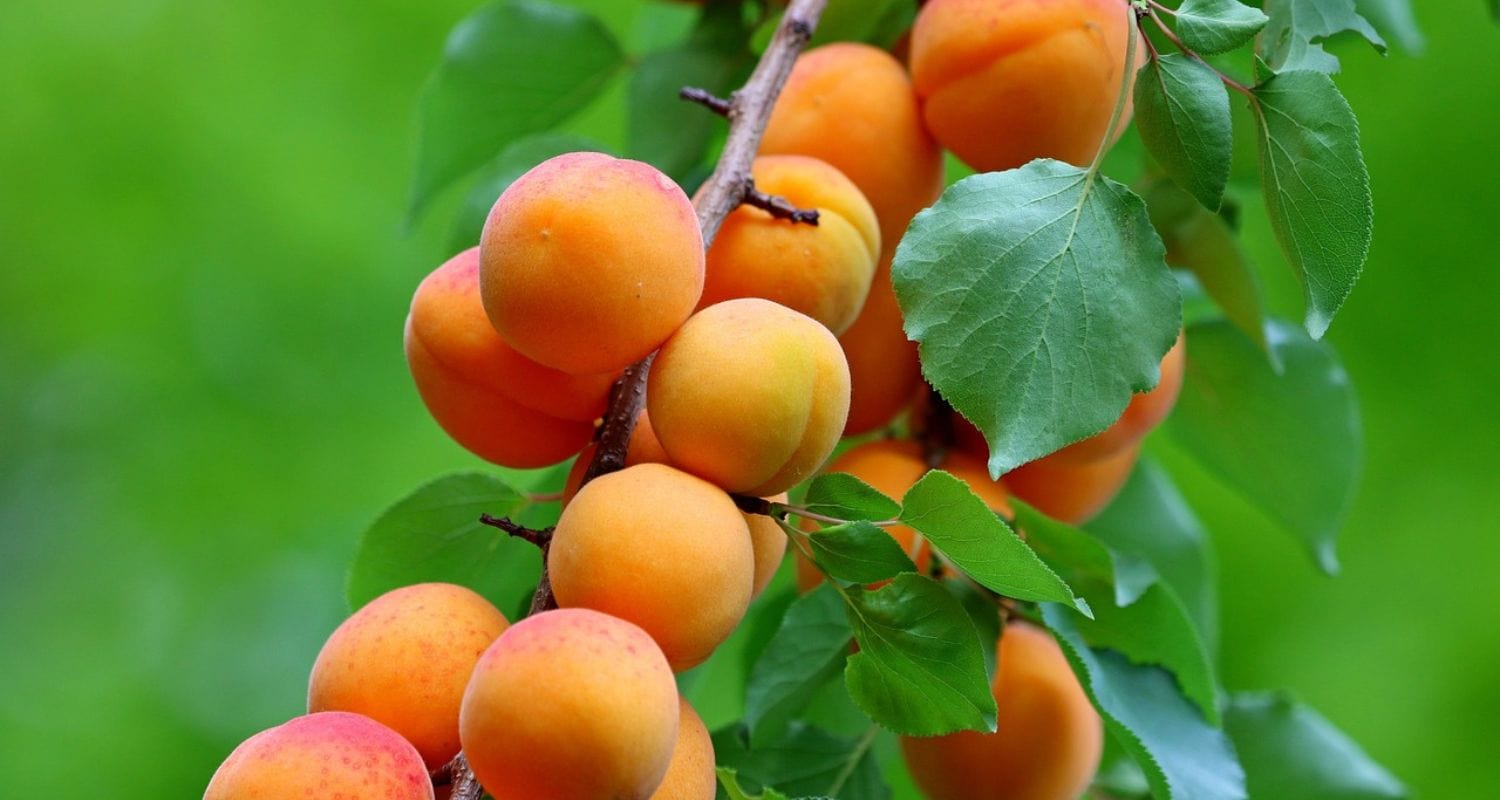Advice & Inspiration
Are Apricots Good for You?

The taste of a ripe apricot on a hot, summer’s day is seriously hard to beat. Sweet, juicy and oh-so moreish, these little orange fonts of flavour can be eaten fresh, baked into desserts or dried for a handy snack. But just how healthy are they? In this article, we’ll dive into all the details of this delectable drupe (stone fruit), including its major health benefits.
How healthy are apricots?
Although it can vary from variety to variety, apricots generally consist of around 85% water, with the macronutrients split approximately as follows: 13% carbohydrates, 1.5% protein and 0.5% fat.
A fruit that’s not only delicious but also healthy, apricots are known to help promote greater eye health, as well as improving digestion and immune functioning. Let’s take a look at the nutrient makeup of apricots in a bit more detail.

Apricot nutrition
100g of apricots contains roughly the following quantities of these selected vitamins and minerals (according to the US Department of Agriculture). Nutrients that apricots are particularly rich in have been highlighted in green:
|
Vitamin/mineral |
Amount |
Proportion of RDA |
|---|---|---|
|
Vitamin A |
96µg (micrograms) |
13.7% (men) 16% (women) |
|
Vitamin B6 |
0.054mg (milligrams) |
3.9% (men) 4.5% (women) |
|
Vitamin C |
10mg |
25% |
|
Vitamin E |
0.89mg |
22.3% (men) 29.7% (women) |
|
Calcium |
13mg |
1.9% |
|
Phosphorous |
23mg |
3.3% |
|
Iron |
0.39mg |
4.5% (men and women over 50) 2.6% (women aged 19 to 49) |
|
Magnesium |
10mg |
3.3% (men) 3.7% (women) |
|
Potassium |
259mg |
7.4% |
|
Copper |
0.078mg |
6.5% |
Apricots are also rich in several antioxidants, namely beta-carotene, lutein and zeaxanthin, as well as dietary fibre.
Beta-carotene
Orange fruits and vegetables like apricots are rich in a chemical called beta-carotene. Boasting several health benefits, including improved eye, brain and heart health, 2.16mg (the American medical centre, the Mayo Clinic, recommends adults consume between 6 and 15mg of beta-carotene daily).
Lutein
Lutein, like beta-carotene, is another carotenoid with antioxidant properties. It’s thought that it might be associated with lower cancer risk, improved memory and delaying the appearance of cataracts in the eyes.
Zeaxanthin
Rounding out our trio of amazing antioxidants is zeaxanthin. Again reducing the risk of eye diseases like age-related macular degeneration (AMD) and glaucoma. It might also help with conditions like Alzheimer’s, though more research is needed in this area.
Dietary fibre
Apricots are high in dietary fibre, containing 2.1g per 100g of fresh fruit. This works out as 7% of your recommended daily fibre intake (the NHS recommends adults consume 30g of fibre per day). Fibre helps with gut health, may aid in lowering blood cholesterol and can reduce the risk of developing diseases like bowel cancer.
Calories in apricots
There are 48 calories per 100g of fresh apricots and roughly 215 calories per 100g of dried apricots. The difference can be largely explained by the more concentrated sugar content found in dried apricots.
Sugars in apricots
Speaking of sugars, apricots are – like many fruits – naturally quite high in sugars, with 100g of fresh apricots containing 9.24g of sugars, while the same quantity of dried apricots contains 43g of sugars.
That means 100g of fresh apricots provide 30.8% of your recommended daily sugar intake, with 100g of dried apricots exceeding the recommended amount of daily sugar (143.3%). This means you should be careful with your consumption of dried apricots, but we’ll come onto how many you should eat per day a little bit later on.
The main apricot benefits
We’ve already scratched the surface on some of the health benefits provided by eating apricots, but now let’s delve a bit deeper and really excavate the heart of this fab fruit’s health credentials…
Eye health
As alluded to above, apricots are great for your eye health thanks to their high vitamin A and carotenoid antioxidant content. Reducing the risk of retinal diseases (like AMD) and conditions which can damage the cornea, such as xerophthalmia, a healthy consumption of vitamin A is important in keeping your eyes in ship-shape condition.
Skin health
The plant-based chemicals (phytonutrients) in apricots – like flavonoids, for instance – can help better prevent skin damage from sunlight, as well as improving skin elasticity and combatting wrinkles.
Digestion
One of the reasons that apricots are so good for digestion is that they offer a good mix of both soluble and insoluble dietary fibre. The former helps reduce cholesterol and balances blood sugar levels, while the latter aids with more regular bowel movements and can help prevent constipation.
Immune functioning
The vitamin C content of apricots may help your body’s immune system perform better, staving off harmful pathogens and building your body’s defences against disease (both respiratory and systemic). Who wants to take a boring supplement tablet when you can bite into a fresh, scrummy apricot, instead?
Cardiac (heart) health
Eating apricots can help reduce cholesterol, blood sugar and the chance of heart disease. Why? Well, as we’ve already discussed, the dietary fibre in apricots can help with cholesterol levels, the potassium found in the fruit can aid in the reduction of blood pressure, with the same mineral also leading to a reduced risk of myocardial infarction (heart attack) or stroke.
How many dried apricots should I eat per day?
Because of their concentrated sugar content, it’s best not to go too gung-ho on the dried apricot front. A handful is usually plenty, and gives you a good hit of sugar to get you through that mid-morning slump. As snacks go, though, these little flavour powerhouses are definitely preferable to more processed alternatives.

Are homegrown apricots healthier?
To an extent, yes! Picking your apricots fresh has several health benefits over buying from the supermarket, including maximising freshness (the fresher the fruit, the less the nutrient deterioration) and reduced bruising (as this can, again, can lead to a loss of nutrients).
Other benefits of growing apricots at home
Another major benefit of growing an apricot tree at home is the reduced environmental impact. Store-bought apricots are often grown abroad and flown in, emitting large amounts of greenhouse gases like CO2 in the process.
Besides any green benefits, there’s another benefit to growing apricots at home – they taste better! It’s scientifically proven* that apricots grown in your garden taste better than those scanned at the supermarket. The satisfaction of growing your own fruit is practically unrivalled and you get a gorgeous-looking tree in your garden to boot.
*Wearing a white coat and goggles makes us scientists, right?

Final thoughts
So, are apricots good for you? Yes, they are! As with any fruit, when eaten in moderation apricots provide a number of health benefits. The only thing going against them is their relatively high sugar content, particularly when dried, but when consumed as part of a balanced diet, this isn’t an issue. If you’re wondering what apricot tree is best for your garden, then wonder no more…


















